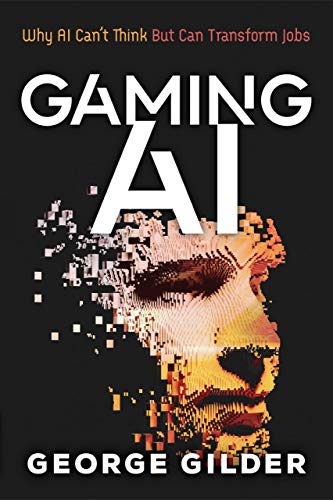Gaming AI
Why AI Can't Think but Can Transform Jobs
Gilder George
BOOK REVIEW

In a world increasingly dominated by technology, Gaming AI: Why AI Can't Think but Can Transform Jobs by George Gilder emerges as a treasure trove of insights, daring us to confront the very essence of artificial intelligence and its implications for our future. Gilder, a renowned tech visionary and author, throws a spotlight on a paradox that often eludes casual observers: AI, while capable of astonishing feats, lacks the true cognition we attribute to human intelligence. This work is not merely a dry exploration of algorithms; it is an exhilarating journey into the heart of how AI can reshape our job landscape and challenge our understanding of thinking itself.
The text is a sharp critique of the misconceptions surrounding artificial intelligence, especially in an era where machine learning and automation dominate headlines. Gilder's argument is both refreshing and provocative: AI cannot think. It merely processes and mimics human behavior through complex data patterns. Yet, in recognizing this limitation, we unveil a world teeming with potential. AI's real transformative power lies not in its ability to replicate human thought, but in its capacity to augment our work, freeing us from mundane tasks to unleash creativity and innovation.
As Gilder articulates, the essence of human employment is not in the repetitive drudgery easily handled by machines, but in the uniquely human abilities that AI cannot replicate-creativity, emotional intelligence, empathy. Thus, AI becomes a tool, a powerful ally in our quest for efficiency and productivity, yet devoid of the soul that makes our labor meaningful. This revelation triggers a profound realization: our workplaces are not about competing against machines, but rather collaborating with them to foster a richer, more dynamic workforce.
Critics have offered a mixed bag of responses to Gilder's assertions. Some hail his perspective as a clarion call for a more human-centric approach to technology, applauding how he grapples with the daunting question of job displacement. Others counter that Gilder's dismissal of AI's capabilities may overlook the potential for machines to evolve beyond their initial programming, hinting at a future where AI could surprise us all. Nevertheless, the conversation Gilder ignites is essential, encouraging us to critically evaluate the intersection of humanity and technology in a rapidly changing world.
Moreover, Gilder's background enriches his arguments profoundly. A luminary in the tech realm, he has long advocated for the transformative power of information technology-not just as a tool for efficiency, but as a vital component in the ongoing evolution of civilization itself. His insights are steeped in a rich tapestry of historical context, positioning musicians, entrepreneurs, and workers as agents of change within this new paradigm. As he navigates through historical anecdotes and contemporary case studies, Gilder's narrative transcends the confines of academia, extending a powerful challenge to readers: how will you embrace this transformation?
The elegance of Gaming AI lies not just in its analysis, but in the emotional resonance it carries. Gilder's prose inspires an almost feverish enthusiasm for the potentialities of work in the age of AI. The book is laced with stories of entrepreneurs who have harnessed AI to ignite creativity and innovation, demonstrating the invigorating possibilities that lie beyond the fear of job loss. These insights are not merely theoretical; they speak directly to you, urging you to reflect on your own career trajectory and how you can leverage AI in your life.
As we stand on the brink of this techno-evolution, Gilder compels us to confront an unavoidable reality: the future of work is not about machines replacing us, but rather about forging a partnership with them. This groundbreaking treatise will resonate with readers from varied backgrounds-whether you're a tech enthusiast, a skeptical worker fearing job automation, or a thinker curious about the evolving nature of work itself. In a time marked by anxiety over technological advancement, Gaming AI emerges as a beacon of hope, challenging you to reconsider your own relationship with technology and the fundamental nature of intelligence.
By engaging deeply with the ideas Gilder presents, you not only gain insight into the role of AI in reshaping jobs, you also participate in a larger conversation about what it means to be human in an increasingly machine-driven world. Don't miss the chance to immerse yourself in this compelling exploration. The insights within could just propel you into a future where you are not just surviving, but thriving alongside the very technologies that seem poised to disrupt your world. Embrace the challenge. 🌌
📖 Gaming AI: Why AI Can't Think but Can Transform Jobs
✍ by Gilder George
🧾 66 pages
2020
#gaming #cant #think #transform #jobs #gilder #george #GilderGeorge